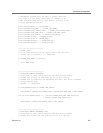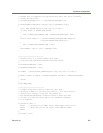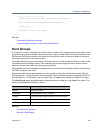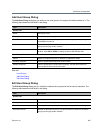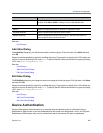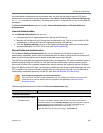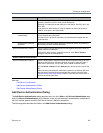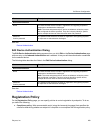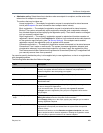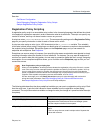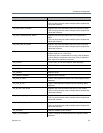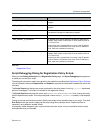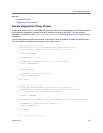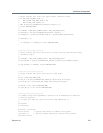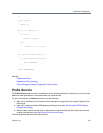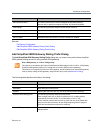
Call Server Configuration
Polycom, Inc. 269
● Admission policy: Select the action to be taken when an endpoint is compliant, and the action to be
taken when an endpoint is noncompliant.
The actions that may be taken are:
Accept registration — The endpoint’s registration request is accepted and its status becomes
Active (see Endpoints for more information about endpoint status values).
Block registration — The endpoint’s registration request is rejected and its status becomes
Blocked. The system automatically rejects registration attempts (and unregistration attempts)
from blocked endpoints without applying the registration policy. Their status remains unchanged
until you manually unblock them.
Reject registration — The endpoint’s registration request is rejected and its status remains not
registered. It doesn’t appear in the Endpoints list. Whether it can make and receive calls depends
on the system’s rogue call policy (see Call Server Settings). If the endpoint sends another
registration request, the registration policy is applied to that request.
Quarantine registration — The endpoint’s registration request is accepted, but its status becomes
Quarantined. It can’t make or receive calls. The system processes registration attempts (and
unregistration attempts) from quarantined endpoints, but doesn’t apply the registration policy.
Their status remains either Quarantined if registered or Quarantined (Inactive) if unregistered until
you manually remove them from quarantine.
You can also specify whether the policy is to be applied only to new registrations, or also to re-registrations
with changed properties.
The following table describes the fields on the page.
Field Description
Allow site-less registrations If this option is selected, endpoints that don’t belong to a configured site or
territory can register with the Call Server. Otherwise, only endpoints in a
subnet configured in the site topology can register.
When compliant Select the action to take when the registration policy script returns
COMPLIANT.
When noncompliant Select the action to take when the registration policy script returns
NONCOMPLIANT.
Policy Applies Select whether to apply the registration policy script only to new registrations
or also to changed re-registrations.
If you choose the latter, you can optionally select Ignore IP and port
changes so that the registration policy script is not applied if those are the
only changes.
Registration policy compliance
script
Type (or paste) the registration policy script you want to apply. Then click
Debug this script to test the script with various variables.
Click Reapply policy to run the script, applying any changes you’ve made to
existing registered endpoints.
Inactive registration deletion days Select to specify that endpoints whose status is Inactive (that is, their
registrations have expired) are deleted from the system after the specified
number of days.
Some dial rule actions, such as Resolve to registered endpoint, can route
calls to endpoints with an inactive registration. Deleting the registration record
is the only way to prevent resolution to an inactive endpoint.



